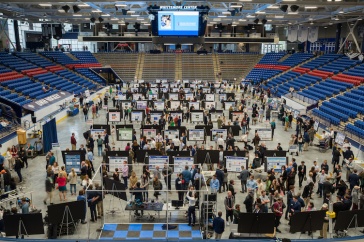
The ubiquitous bouquets of flowers and boxes of chocolates that overflow big box store displays every February illustrate the significant commercial focus of Valentine’s Day. But what about the true spirit of the holiday? At its heart – pun playfully intended – Valentine’s Day is about celebrating and nurturing partnerships and relationships.
For a trio of researchers in UNH’s College of Health and Human Services, that’s just another day at the office.
Lauren Harris, Tyler Jamison and Marissa Mosley have all dedicated their careers to different aspects of relationship-based research, exploring the ways our interpersonal connections impact our emotions, our mental and physical health and our lives overall.
Valentine’s Day is the perfect point on the calendar to shine a light on some of the work they are doing and some of the interesting conclusions they are drawing in a field that is about as broad in its impact as any area of research can be.
“It affects everyone. The types of principles we learn from relationship science, like how to communicate with someone you are really close to, is universally meaningful,” Jamison says. “There is plenty of research that shows there’s a strong connection between the quality of our relationships and our health and well-being.”
Lauren Harris
Harris’s area of focus is the early stages of romantic relationships, from singlehood and early dating up through engagement – “I like to say it’s everything between being single and getting married,” Harris says.

Harris, a qualitative scholar, works with interview-based data, looking at the process of moving from singlehood into dating – how people navigate that transition, what meaning might be attached to their choices and what those early stages of romantic relationships look like.
The early stages of dating don’t necessarily happen in the early stages of life, though, and that’s been the focus of Harris’s most recent work. She interviewed 100 adults – 50 men and 50 women – between the ages of 60 and 83, all of whom were single at the time of the interview but looking for someone to date, in hopes of exploring the experiences of searching for, meeting and dating potential romantic partners for older adults.
All participants were active users of online dating sites.
An interesting aspect of the research, Harris says, has been learning how many of the participants have adapted to learning to date again as an older adult. Many are recently widowed or divorced, sometimes dipping their toes into the dating pool for the first time in decades.
“Some of them have said they haven’t dated since they were 22,” Harris says. “They are all navigating changing social norms and gender roles – they’re trying to merge how they’ve grown up with dating and what dating is today and navigating that difficult balance there.”
Harris conducted the initial interviews in 2020, and is planning to connect with the same participants sometime within the next year or so to get updates on things like who is in a relationship, who has completely opted out of dating, etc.
“One thing I love about studying older adults is I think we think of people as having their one great love or love of their life, that you get married once and that’s it,” Harris says. “But that’s not reality. We can have a second love of our life – you can fall in love at any time. It’s never too late.”
Tyler Jamison
Jamison is a family and relationship scholar who centers much of her research on the concept of romantic development in young adults. “Romantic development is essentially how individuals build the capacity to form the types of relationships they want for themselves, to explore what kind of partner you want and what kind of partner you want to be,” she says.

Her work focuses on romantic relationships in parallel to human development in young adulthood – how we learn about ourselves through those relationships, typically between the ages of 18 and 29.
Jamison – who also writes a blog for Psychology Today – has recently brought her research into the classroom, having designed an assignment in which students were asked to identify a couple in a romantic relationship for at least one year and facilitate a conversation between those two people where they asked each other to “tell me a story about a time you felt loved by me.”
Jamison and her students found participants to be very receptive to participating, and over the course of three semesters they have accumulated stories from 163 couples. She is currently working with 12 undergraduate and one Ph.D. student to process and analyze the data.
An intriguing early finding is that many participants said they feel most loved in times where they were feeling vulnerable and someone showed up for them in a caring way – in other words, the moment highlighted was often not romantic. Additionally, Jamison and her team tried to fit the responses into one of the five love languages made famous in Gary Chapman’s book, and realized many don’t fit very easily. “There’s not really a place for emotional support anywhere in those five,” she says.
Beyond studying what happens when young adults enter relationships, Jamison also believes it’s important for them to learn how to realize it’s time to end one, and how to do so safely. She is working on an NIH grant proposal for just that purpose – to look at how to build capacity in young people to end relationships.
“There’s a huge gap in education around breaking up – whether it’s in an unhealthy or possibly abusive situation that can be harder to get out of or not, people lack the skills to end relationships safely and well,” Jamison says, noting that in many cases leaving a relationship may be the healthiest outcome for many young adults, even though they aren’t often taught to think that way. “We want to challenge the idea that in relationships, staying together is always the outcome that we want.”
Marissa Mosley
Mosley is an assistant professor in the marriage and family therapy program – and also an active therapist in the field – and uses her experience to bridge the gap between research and clinical application. Her research primarily focuses on the role of technology in relationships, romantic and otherwise, largely through an attachment theory lens.

“I look at how attachment theory, anxiety and avoidance levels might influence the role that technology plays in our relationships,” she says.
Her most recent work has focused on the role of “phubbing” – or phone snubbing – in relationships, and its impact on both partners. Phubbing is the act of ignoring the person you are with in favor of your phone, and Mosley gathered data from 100 couples to explore the topic (the study was open to those aged 18 to 64, but the average range was mid-20s, Mosley says).
What she found was that those who are naturally more anxious or more avoidant in their attachment style were more likely to phub their partner, thereby negatively impacting the satisfaction of both people. That wasn’t necessarily surprising – but what was, she says, is that those with higher attachment avoidance, when combined with increased phubbing, had more negative effects on partner’s satisfaction than those with attachment anxiety.
“When you think of avoidant attachment style, you think of people who might be very independent, who have that fear of dependence on someone else,” Mosley says. “The idea that we saw that being a more significant outcome is interesting, because it is very counter-intuitive to a lot of research that’s been done. It gives more of a voice to those that have an avoidant attachment style.”
Beyond romantic relationships, Mosley is also investigating the role video games can play in how friendships are built and maintained, particularly in men, as it appears many would rather have communication with someone long distance through a video game rather than making a phone call.
Her research work with romantic partners is particularly important to her career as a therapist, as it provides an additional lens through which she can view things as she tries to help her clients.
“Especially for me, as not only a researcher but a clinician, I want to know about these things so it can inform my clinical work and make me more effective and impactful in the clinical realm,” she says. “Relationships are the foundation of so much in terms of our mental health and satisfaction in life.”
With that in mind, on the topic of Valentine’s Day, all three researchers say they believe it’s a great opportunity to put relationships in the spotlight – but they also all believe that’s something everyone should ideally be focusing on year-round, rather than on just a single special day.
But despite that caveat and the ever-increasing commercialization of Valentine’s Day, Harris, in particular, is still enthused about the opportunity Valentine’s Day provides to set time aside to spend the day with a loved one, whether bouquets or boxes of chocolates are part of the plan or not.
“I think one of the things I’ve taken away from my research is how much we value love and romance in our lives,” she says. “There is certainly a layer that Valentine’s Day is very commercialized, but I am all for any extra reason to celebrate love in someone’s life. Why not enjoy it? Take an extra day to value that, to center that. At its core the idea is to value and spend time with the people you love, and that’s worth celebrating.”
-
Written By:
Keith Testa | UNH Marketing | keith.testa@unh.edu
















































